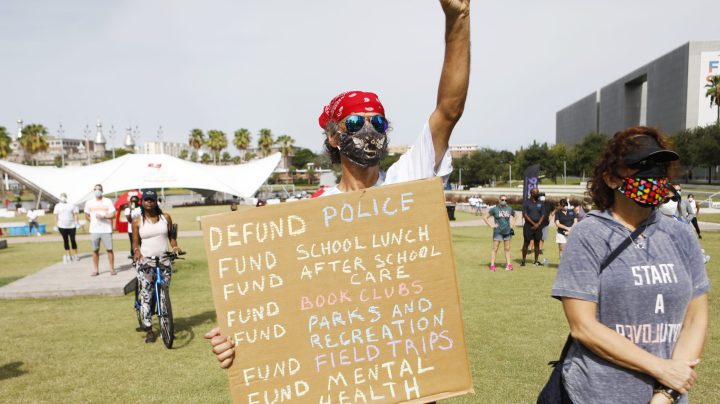Rep. Joaquin Castro on Police Brutality in Latino Communities

Dave Gonzalez stands in protest at the "Love Walk" holding a Defund Police sign before the start of the "Love Walk" at Curtis Hixon Park on June 27, 2020 in Tampa, Florida. Photo by Octavio Jones/Getty Images
Over the last couple of weeks, instances of police violence have continued in the face of growing protests and calls to defund the police. In addition to the killing of Black men such as Rayshard Brooks, who was shot in Atlanta, the deaths of several Latino men have also become part of the national conversation around law enforcement and brutality. Andres Guardado, Sean Monterrosa, and Carlos Adrián Ingram-López are just a few of the Latinos who have died at the hands of police since April.
On Sunday, Congressman Joaquin Castro went on NPR’s Weekend Edition and led a discussion about how the police force affects Latino communities. According to Washington Post research cited by NPR, Latinos have been the second-highest demographic killed by police since 2015.
“It’s not an issue that’s associated with Latinos in the same way that it’s associated with African American men in particular, but it has been a real problem for the Latino community throughout the country, particularly in inner-city neighborhoods of folks being profiled, folks being killed over the years,” Castro said. He pointed out issues of police unions, which have often kept officers from facing severe consequences in cases of police killings.
“There are local collective bargaining agreements that need to be, I think, rewritten so that police can no longer collectively bargain on issues of accountability and discipline and conduct,” he said. “Because that is what has allowed a lot of officers who are preying on the public to stay on the police force.”

He also noted that the George Floyd Justice in Policing Act passed recently by the House of Representatives, which could lead to improvements. The bill still needs to be passed by the Senate.
Non-Black Latinos should not overshadow the struggles of the Black community, who are most impacted by racial injustice. However, the data on police brutality in Latino communities—and the simple fact that many Latinos also identify as Black—are reminders of why uniting and standing in solidarity with the Black Lives Matter movement is such an imperative.